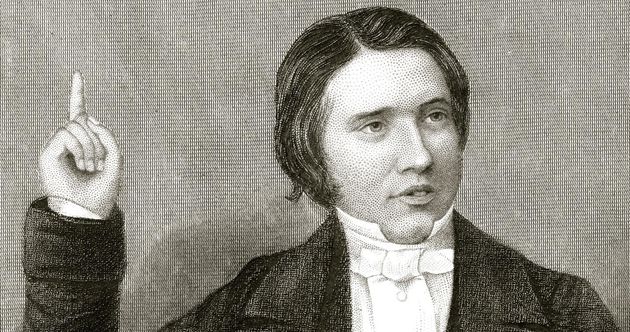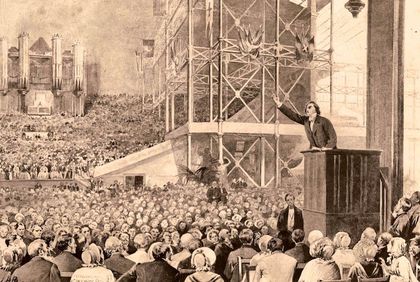Spurgeon: The Infallibility of Scripture
Spurgeon's famous sermon turns 130 years old.
17 MARCH 2018 · 10:00 CET

It was this very week some 130 years ago when the prince of preachers, Charles Haddon Spurgeon, stood up in his Metropolitan Tabernacle pulpit to address the grand theme of ‘The Infallibility of Scripture’.
Today, in honour of the Englishman’s legacy, I will present a brief summary of the message.
Sermon: The Infallibility of Scripture
Text: “The mouth of the Lord has spoken it” (Isaiah 1:20)
Spurgeon kicks off his sermon by drawing his hearers’ attention to the attitude of the Lord Christ and His apostles to the Old Testament Scriptures. If they were so willing to subject themselves to God’s written and inspired revelation, “how much more should we, who have no spirit of prophecy resting upon us, and are not able to speak new revelations, come back to the law and to the testimony”.
If Christians are to follow the path of Christ and the apostles, they must not entertain a critical spirit when consulting the oracles of God. Scripture requires a hermeneutic of trust; not of modern suspicion. The Bible is the Word of God. “The mouth of the Lord has spoken it”. When God speaks, who are we to doubt?
Point 1: Isaiah 1:20. This is our warrant for teaching scriptural truth.
Preachers preach what they preach because they are commanded to do so by Scripture.
Their lofty calling is so intense that they often, like Martin Luther and George Fox, share the Word in much fear and trembling. God’s spokesmen have heard the Lord’s severe admonition, “If the watchman warn them not they shall perish; but their blood will I require at the watchman’s hands”.

Since Scripture is God’s written Word, ministers have no right to chop and change it as they please. They are slaves of Scripture; not its master. “It is not ours to correct the divine revelation, but simply to echo it”. And again, “It is not mine to amend or adapt the gospel. What? Shall we attempt to improve upon what God has revealed?”
Along with their faithful trembling, pastors are also called to be exceedingly bold in their delivery of the message as they represent the high King of heaven. Given that preachers stand before men in the name of God, they should never dare to preach for popular applause. To tone down the Word is to be guilty of celestial treason. “When we speak for Lord against error, we do not soften our tones, but we speak thunderbolts”.
Point 2: Isaiah 1:20. This is the claim of God’s Word upon your attention.
Preaching is of far more importance than any decree of earthy princes, kings or parliaments because it is the speech of the Most High. Every creature must be silent before the voice of the sovereign Creator.
Although God is so high, exalted and enthroned in majesty, He has condescended to speak to us in terms we can understand. If the Lord has taken such pains to utter forth His Word to His creatures, how can we do otherwise than to pay the strictest attention? Any other attitude would be the height of ingratitude.
“Do hear Him, I beseech you. I am not asking a favour of you when I request you to hear the Word of the Lord; it is a debt to your Maker which you are bound to pay. Yes, it is moreover, kindness to your own self. Even from a selfish point of view, I urge you to hear what the mouth of the Lord has spoken, for in His Word lies salvation”.
Point 3: Isaiah 1:20. This gives to God’s Word a very special character.
Isaiah 1:20 reveals the unique nature of the Scriptures. There have been plenty of books published about God over the years; but there is only one book penned by the Spirit of God. In the light of Scripture’s plenary inspiration, we would be fools to cast doubts upon the contents of the Bible.
“Where are we if our Bibles are gone? Where are we if we are taught to distrust them? If we are left in doubt as to which part is inspired and which is not, we are as badly off as if we had no Bible at all. I hold no theory of inspiration; I accept the inspiration of Scriptures as a fact”.
Thanks be to God, His infallible Word does not change with the ups and downs of the modern theological enterprise. One man once said to his minster, “My dear sir, surely you ought to adjust your beliefs to the progress of science”. “Yes,” replied the pastor, “but I have not had the time to do it today, for I have not yet read the morning papers”.
A theology that is always chopping and changing is no better than quicksand. The Word of God is a rock and a fortress.

Point 4: Isaiah 1:20. This makes God’s Word a ground of great alarm to many.
Scripture offers manifold promises of blessing and goodness to the repentant. Nevertheless, it also holds forth fierce threatening to the enemies of the Gospel. Every time God threatened a nation in Scripture,
He saw His promise through to the end. Babylon, Nineveh, Edom, Moab, Bashan and even the very people of God had to face the wrath of God due to their chronic disobedience and moral perversion.
God then, in a word, fulfils both His pleasant and not so pleasant promises. “The Lord never plays at frightening men. His Word is not an exaggeration to scare imaginary bugaboos. There is emphatic truth in what the Lord says. He has always carried out His threats to the letter”.
Unbelievers, therefore, should not appeal to the “love of God” in an attempt to rob God of His holy warnings. Those who do not believe the gospel shall be damned for all eternity, regardless of the conclusions to which their humanistic philosophizing leads.
But the good news is that we are all still in the day of grace. Christ stands forth with His arms outstretched urging condemned sinners to turn to Him today for forgiveness of sins and eternal life.
Point 5: Isaiah 1:20. This makes the Word of the Lord the reason and rest of our faith.
The Scripture is the Word of God. This means that is our place of confidence. Even when we feel unworthy and weak, God’s promises stand true. God will not leave us nor forsake us.
“When friends forsake me, and foes belie me, and my own spirit goes down below zero, and I am depressed almost to despair, I am resolved to hang to the bare Word of the Lord, and prove it to be in itself an all-sufficient stay and support”.
As we draw near to death, still too the Word of God proves faithful and powerful. We have the blessed promise that we will see the King in Zion. This blessed Word will keep us steadfast and sure while the billows roll.
Here is brother Spurgeon’s conclusion:
“Brethren, we have not followed cunningly devised fables. We are not wanton boys that swim on floats which will soon burst under us, but we are resting on firm ground. We abide where heaven and earth are resting; where the whole universe depends; where even eternal things have their foundation; we rest on God Himself.”
“If God shall fail us, we gloriously fail with the whole universe. But there is not fear; therefore, let us trust and not be afraid. His promise must stand for ‘the mouth of the Lord has spoken it. Oh, Lord, it is enough. Glory be to Your name, through Jesus Christ! Amen”.
Published in: Evangelical Focus - Fresh Breeze - Spurgeon: The Infallibility of Scripture
